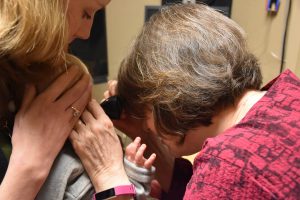Prerequisites

Program of study leading to licensure in the state of North Carolina and in compliance with accreditation standards (Accreditation Commission for Audiology Education and Council on Academic Accreditation)
Required coursework:
- Life Science: A minimum of 4 credits of biology, preferably with lab. The ideal student will have 2 or more courses with content including for example: cell biology, human biology, genetics, physiology, biochemistry. Advanced Placement (AP) credit does not fulfill this requirement. Courses in ecology, plant biology, and nutrition for example, are also not accepted. Graduate coursework requires an understanding of the biology and biochemical processes of the ear and human body.
- Physical Science: A minimum of 4 credits of physics or chemistry. For Fall 2023 entrance a minimum of 3 credits will be accepted. Both of these sciences provide foundational content relevant to audiology. First year graduate coursework requires an understanding of the physics of sound and its perception. Advanced courses like Pharmacology in Clinical Practice build on the knowledge of fundamental biochemical principles. AP credit will not fulfill this requirement.
- Behavioral Science: At least one course in psychology or sociology. Other social sciences courses may be accepted on an individual basis.
- Anatomy: A 4 credit course in Human Anatomy and Physiology is preferred, but for Fall 2023 entrance, a 3 credit course in human anatomy alone, neuroanatomy, or anatomy of the speech and hearing mechanism is acceptable. Anatomy and physiology coursework cannot be applied to both the Life Sciences and the Anatomy Prerequisites.
- Normal Language Development: At least one course in the area of normal language. Often these courses are offered within psychology or linguistics departments. Either is acceptable. The focus of the course should be on the typical development of spoken language in humans.
- Statistics: At least one course in basic or advanced statistics taken within the college program of study. Appropriate coursework may be offered within a variety of academic departments. AP credit will not satisfy this requirement.
- Introduction to Audiology: The program requires that applicants have taken an introductory course specifically related to audiology. The purpose of this requirement is to assure that applicants understand the full scope of audiology practice. An online course can satisfy this requirement if the applicant is from a school that does not offer any courses of this nature or is a post-grad. Alternatively, an applicant may demonstrate an understanding of audiology practice in its entirety through substantial and varied observation, work, and /or volunteer experiences. Contact the Admissions Office in advance for an evaluation of your experience.
| Category | Eligible Courses |
|---|---|
| Anatomic and Physiologic Bases | Human Biology (that includes anatomy and physiology), Human Anatomy, Neuroanatomy or Anatomy of the Speech and Hearing Mechanism |
| Introduction to Audiology | Introduction to Audiology |
| Life Science | Biology with Lab or higher level courses like Genetics, Physiology, Biochemistry |
| Physical Science | Physics with lab or Chemistry with lab |
| Behavioral Science | Psychology or Sociology |
| Linguistic and Psycholinguistic Bases | Normal Language Development |
| Statistics | Statistics (taken at the college level) |